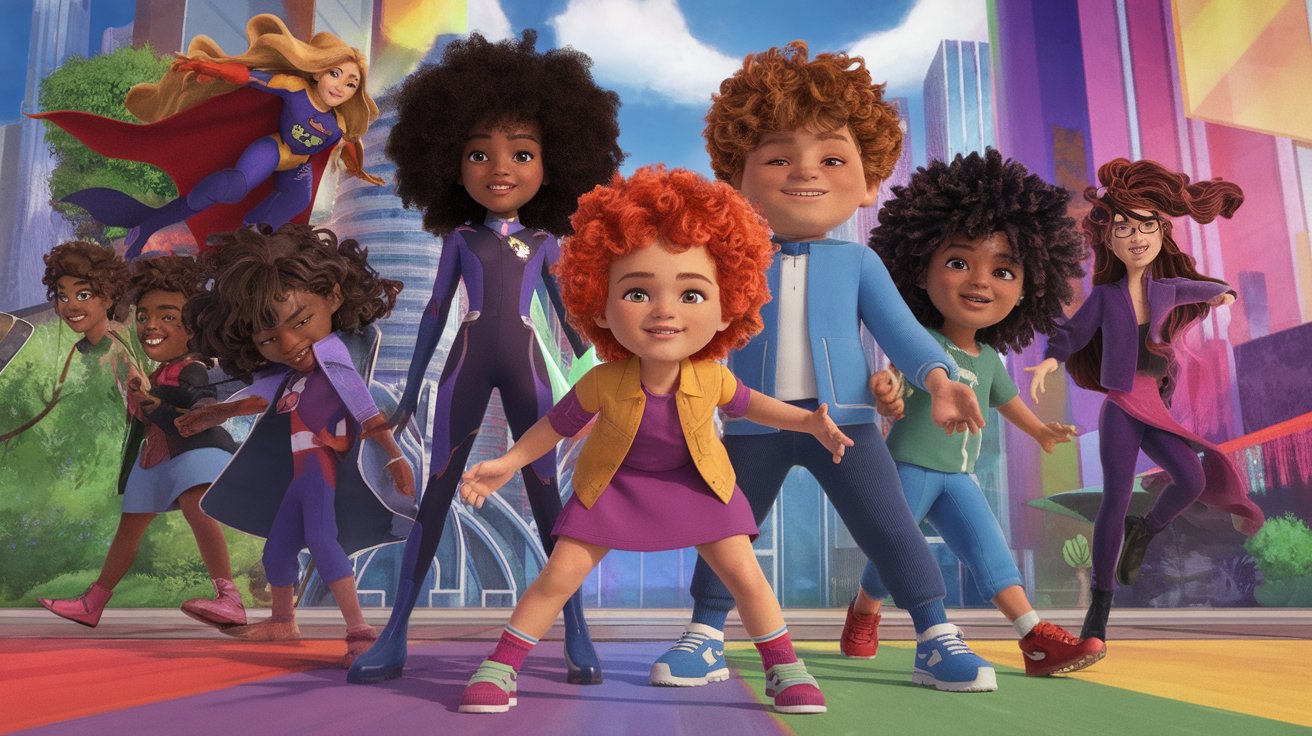- Galaxy Projector for Bedroom, Bluetooth Speaker
- White Noise Aurora Projector, Night Light Projector
- Kids Adults Gaming Room, Home Theater, Ceiling, Room Decor
Introduction
Hair has long been associated with identity and self-expression, especially for women. In recent years, the movement towards embracing natural hair has challenged societal beauty standards that once constrained women to specific looks. These evolving perceptions highlight the importance of hair in women’s empowerment and individuality. By breaking stereotypes, women are reclaiming their beauty and celebrating their unique styles.
This shift towards embracing natural hair is not only about appearance but also about empowerment. Hair care experts play a pivotal role in guiding women through this transformation, offering insights into how to care for and style their natural hair. With the rise of movements that celebrate hair diversity, women are now more empowered than ever to challenge traditional norms and express themselves freely.
Key Takeaways
- Hair is a powerful tool for women’s self-expression and individuality.
- Challenging traditional beauty standards empowers women to embrace their natural hair.
- Natural hair movements encourage inclusivity and diversity in beauty norms.
- Hair care experts play a vital role in supporting women’s hair journeys.
- Rejecting societal pressures allows women to reclaim their identity through their hair.
- The celebration of hair diversity fosters empowerment and confidence in women.
Explore Topics on the Impact of Hair on Women’s Empowerment

Hair plays a significant role in women’s empowerment, as it often becomes a symbol of self-expression and individuality. By exploring different hair types and styles, women can challenge societal norms that have long dictated what is considered beautiful. Breaking these stereotypes empowers women to embrace their natural hair and celebrate their unique identities. The transformation of hair has deep roots in cultural significance and is closely tied to personal empowerment. Today, more women are embracing the shift towards inclusivity and diversity in beauty, helping create a society where natural beauty and individuality are not only accepted but celebrated.
Hair as a Symbol of Individuality
Hair has always been a powerful symbol of individuality and self-expression. For women, it can represent their personal journey, identity, and beliefs. By embracing their natural hair, women are breaking away from societal stereotypes and reclaiming control over their appearance. This shift towards individuality is not just about style but also about empowerment. Hair care professionals and products are now focusing on providing women with the tools to celebrate their unique beauty, contributing to a broader societal change towards acceptance of diversity.
Cultural Significance of Hair in Empowerment
Throughout history, hair has held cultural significance in many societies, especially for women. It has been a way to convey status, identity, and belonging. Today, many women use their hair as a way to empower themselves by challenging traditional norms. The ability to transform one’s appearance through hair—whether by trying new styles or simply letting their natural hair shine—is a form of self-expression and cultural pride. This has helped in shifting the conversation towards embracing diversity and inclusion in beauty standards.
Challenging Stereotypes: Celebrating Hair Diversity Among Women

Challenging hair stereotypes allows women to reclaim their identity and embrace diversity. Hair has long been associated with societal expectations, but now, more women are using it as a powerful tool to break free from these constraints. By celebrating the uniqueness of various hair types, society moves closer to a more inclusive environment. The rise in understanding that beauty standards need to evolve has led to an increase in female empowerment. Experts in hair care are helping women confidently showcase their natural hair, pushing back against traditional norms, and encouraging self-acceptance in the face of outdated expectations.
The Rise of Natural Hair Movements
In recent years, natural hair movements have gained momentum, encouraging women to embrace their natural curls, waves, and textures. These movements challenge the long-standing stereotypes associated with straight or manageable hair. By promoting natural hair, women across the globe are rejecting rigid beauty standards and reclaiming their authentic selves. This celebration of diversity has not only empowered women but also changed the way society views beauty. The success of these movements has inspired many women to step forward and proudly show their true selves.
Breaking Free from Societal Norms
For centuries, women have faced pressure to conform to specific beauty standards, especially when it comes to their hair. However, recent shifts in societal views have encouraged women to challenge these expectations. Breaking free from societal norms and stereotypes allows women to express themselves fully. By rejecting outdated standards, women are now embracing their unique beauty. Hair experts play a crucial role in this transformation by offering guidance and products tailored to diverse hair types, ensuring that each woman feels empowered to own her look.
List of Ways to Celebrate Hair Diversity
1. Embrace Natural Hair Care Routines
Women can celebrate their natural hair by focusing on routines that enhance the health of their specific hair type. This promotes self-love and individuality.
2. Experiment with Bold New Styles
Encouraging women to try new hair styles can help break free from traditional beauty norms, leading to increased self-confidence and empowerment.
Recent Insights into How Hair Stereotypes Affect Women’s Self-Expression

Recent insights show that hair stereotypes continue to influence how women express themselves. Traditional beauty standards have placed unnecessary pressure on women to conform to specific norms, especially regarding hair. However, a growing movement is challenging these perceptions, empowering women to explore their individuality. The connection between hair and identity has been a subject of transformation, particularly in recent years. Many women are learning to celebrate their unique styles and break free from the constraints of societal expectations. This shift towards self-expression allows for greater freedom in how women choose to represent themselves.
The Impact of Beauty Standards on Identity
Beauty standards, especially regarding hair, have long shaped how women express their identity. Many women have felt the need to conform to specific norms to fit in or be considered attractive. However, recent insights show a growing awareness of how harmful these stereotypes can be to individuality. Women are beginning to push back against these standards, choosing to explore new styles and embrace their true selves. This shift is leading to a newfound sense of empowerment, allowing women to redefine their identity on their terms.
Changing Perceptions of Beauty
As societal perceptions of beauty evolve, so too do the ways women express themselves through their hair. No longer confined to rigid stereotypes, women are experimenting with different styles, colors, and textures that better reflect their personalities. This change in perception is empowering more women to take control of their appearance and express their individuality without fear of judgment. By challenging traditional beauty norms, women are contributing to a more inclusive and diverse understanding of beauty.
“Hair is a form of expression and a symbol of freedom, a testament to individuality.” – Tracee Ellis Ross
Understanding the Role of Hair Experts in Redefining Beauty Standards

Hair experts play a crucial role in redefining beauty standards by helping women challenge stereotypes and embrace their natural beauty. With a deeper understanding of how hair impacts identity, these professionals provide insights into how hair can be a tool for empowerment. By guiding women to make informed choices, hair experts contribute to the growing trend of celebrating diversity in hair types and styles. As more women reject traditional beauty norms, experts help pave the way for a more inclusive approach to hair care, encouraging individuality and supporting self-expression through personalized styling techniques.
The Influence of Hair Care Professionals
Hair care professionals are key figures in helping women redefine beauty standards. With their expertise, they provide women with the knowledge and confidence to embrace their natural hair and experiment with new styles. By offering products and techniques tailored to various hair types, experts ensure that every woman can celebrate her uniqueness. Their role in shaping beauty trends and challenging stereotypes is vital in creating a more inclusive society where diversity is celebrated, not overlooked.
Empowering Women Through Expert Guidance
Hair experts empower women by educating them on how to care for and style their natural hair. This guidance helps women break free from societal pressures and embrace their individuality. By focusing on each woman’s unique hair type and providing personalized solutions, hair care professionals foster self-confidence. This empowerment encourages women to challenge traditional beauty standards and express themselves more freely, contributing to a broader movement of female empowerment and self-expression.
Conclusion
The journey towards breaking hair stereotypes is a powerful form of empowerment for women. By embracing their natural hair and rejecting societal pressures, women are reclaiming their identity and challenging traditional beauty standards. This shift has allowed for a broader conversation around self-expression, individuality, and the role that hair plays in shaping how women are perceived.
Hair care experts and natural hair movements have been instrumental in supporting women as they navigate this transformation. As society continues to evolve, the celebration of hair diversity will remain a key factor in promoting inclusivity and self-confidence. Women everywhere are proving that their hair is not just about beauty—it’s a symbol of empowerment and freedom.



